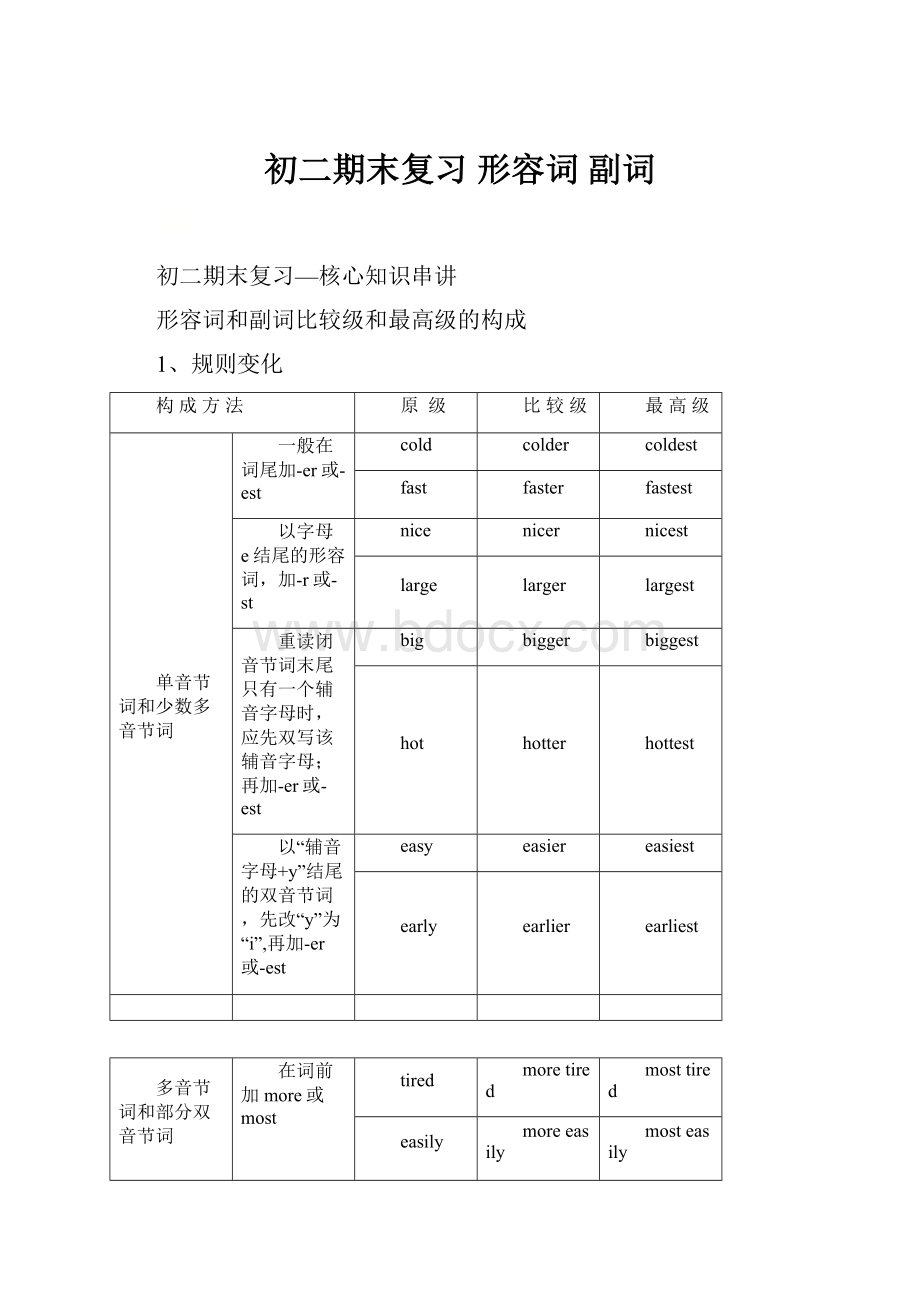初二期末复习形容词副词Word文档下载推荐.docx
《初二期末复习形容词副词Word文档下载推荐.docx》由会员分享,可在线阅读,更多相关《初二期末复习形容词副词Word文档下载推荐.docx(12页珍藏版)》请在冰豆网上搜索。

bigger
biggest
hot
hotter
hottest
以“辅音字母+y”结尾的双音节词,先改“y”为“i”,再加-er或-est
easy
easier
easiest
early
earlier
earliest
多音节词和部分双音节词
在词前加more或most
tired
more
most
easily
2、不规则变化
原级
比较级
最高级
good
/
well
better
best
bad
badly/ill
worse
worst
many
much
more
most
little
less
least
far
farther
farthest
further
furthest
old
older
oldest
elder
eldest
比较级:
1.表示两者之间的比较,通常用连词than引导,表示“更……一些”。
2.much/far/alot,even,still,alittle/abit…修饰比较级,表示程度。
最高级:
1、the+最高级+of+比较范围
2、Oneofthe+最高级
例:
1.Sheisthe________intheclass.(young)
2.Jasonisthe_____ofthethree.(tall)
3.Whosehandwritingisthe____ofall?
(good)
最高级的用法
表示三者或三者以上(人或事物)的比较用最高级,最高级的前面一般要加定冠词the,后面可带of(in,among)短语来说明比较的范围.
1.她女儿是她们学校最好学生之一.
Herdaughteris____________________inherschool.
2.中国长城是世界上最伟大的建筑之一.
TheGreatWallofChinais______________________intheworld.
“最……之一”:
用oneofthe+形容词最高级+名词复数+of/in介词短语.
Thegreenorangesarebig.
Theorangeonesarebigger.
Theredonesarethebiggestofall.
250,000RMB.500RMB50,000RMB.
Thebikeisexpensive.
Theredcarismoreexpensivethanthebike.
Thegreencaristhemostexpensive.
JimTom
Jimisathletic.
TomismoreathleticthanJim.
Stalloneisthemostathleticofthethree.
5000m
5
TheSupermarketisfarfrommyhome.
Thebookstoreisfartherfrommyhome.
Thecinemaisthefarthestfrommyhome.
练习一:
1.Itis_______inthesouththaninthenorth.(warm)
2.Thatquestionis____________thanthisone.(difficult)
3.Shefeltillyesterdayandshefeelseven_______today.(ill)
4.Heismuch_______thanhisyoungerbrother.(young)
5.Lilyis__________ofthetwo.(young)
6.Tomis________ofthetwins.(tall)
7.Whichdoyouthinktastes________,thechickenorthefish?
8.Whoruns_____,TomorJim?
(fast)
练习二:
1.Theenvironmentinourhometownis_____thanitwasbefore.
A.goodB.worseC.betterD.bad
2.Icantype_____thanIcanwritebyhand.
A.fastB.muchfasterC.morefasterD.fastest
3.---Haveyoudecidedwhichyou’dliketobuy,theblackshirtortheyellowone?
---Theblackone.Becauseitis_______ofthetwo.
A.thenicerB.thenicestC.nicer
4.Lileiis_____thananyother_______inhisclass.
A.tall,studentsB.taller,studentsC.taller,student.
比较级+anyother+单数名词.“比其他任何……都……”.(暗指:
最高级)
TheYellowRiveris_______riverinChina.
A.thesecondlongestB.thesecondlongerC.secondlongest
the+序数词+最高级表示第几……
重难点:
一、比较级+and+比较级越来越…
二、the+比较级,the+比较级 越…,越…
1.Thegirlbecomes_____________________.(越来越漂亮)
2.Theweatherisgetting________________.(越来越槽糕)
3._________________youare,________mistakesyouwillmake.
(你越仔细,做错的题目就越少)
4.________youeat,________you’llbe.(你吃得越多,就越胖)
5.Alicewriteswell.Marywrites______________thanshe.(甚至更好)
现在完成时的构成
助动词have(has)+过去分词
过去分词的构成
Type
original
p.t.
p.p.
AAA
cost
read
ABB
meet
met
catch
caught
ABC
ride
rode
ridden
speak
spoke
spoken
drink
drank
drunk
eat
ate
eaten
现在完成时的主要用法
一.表示过去发生或已完成的某一动作对现在造成的影响和结果。
Hehasjustturnedoffthelight.(他刚把灯关了。
)
相当于:
Heturnedoffthelightjustnow.
Thelightisn’tonnow.即关灯这一动作对现在造成的结果和影响:
现在灯不亮了。
Ihavealreadyfinishedmyhomework.(我已经完成了家庭作业。
2.表示从过去某一时刻开始并一直延续到现在的动作或状态,但动作或状态可能仍在继续。
Shehaslivedheresinceshewasborn.
自从她出生时就一直住在这儿。
IhavelearntEnglishformorethantenyears.
我已经学了10多年的英语。
3.表示人曾有过或到目前为止从未有过的经历.
HaveyoueverbeentotheSummerPalace?
(你曾去过颐和园吗?
Ihaveneverhadacar.
(我从未有过汽车。
现在完成时的时间状语
◆常与不确定的时间状语连用,如:
already,never,ever,just,yet,before,sofar,inthepastfewyears等,表示“到目前为止”所发生的动作。
◆还可以和表示一段时间的状语连用,如:
since,foralongtime等.
一个时间点
一段时间+ago
一、since
从句
Mr.Smithhasworkedheresince1984.(1984年以来,史密斯先生一直在这工作。
IhaveknownDanielsince7yearsago.自从7年前我就认识丹尼尔。
He’slearnedabout5000wordssincehewenttocollege.
(他上大学以来大约学了五千个英语单词)
二、for+一段时间(twoweeks/sixmonths/fivedays)
for短语表示动作延续多长时间。
Hehastaughtinthisschoolforfouryears.(他在这个学校教书四年了。
Ihaven’tseenherforalongtime.(我好久没有见到她了。
三、just,already,ever,recently,before,never是完成时态的时间状语,而justnow/amomentago是一般过去时的时间状语。
Thetrainhasjustarrived.(火车刚到。
DidyouseeJoanjustnow?
(你刚才看到琼了吗?
Haveyouheardfromyourfamilyrecently?
(你最近收到家人的来信了吗?
短暂性动词与时间段的关系
●短暂性动词在肯定句、疑问句中不能与时间段连用,这些动词是:
become,begin,buy,borrow,arrive,come/go,die,fall,finish,gettoknow,join,leave,marry等。
●为了表述这种意思,我们常用相应的延续性动词来代替短暂性动词.(如下表)
borrow→keepbuy→have
arrive→bein/atdie→bedead
stop→beoverbegin/start→beon
leave→beaway(from…)
come/go→bein/at
getmarried→bemarried
join→bein/amemberof
也可以仍用原短暂性动词,用句型“Itis…since从句(从句中用一般过去时)或用“一般过去时+…ago”这一结构来表述延续性的动作或状态。
电影开始五分钟了。
Thefilmhasbeenonforfiveminutes.
Itisfiveminutessincethefilmbegan.
Thefilmbeganfiveminutesago.
他入党五年了。
HehasbeeninthePartyforfiveyears.
ItisfiveyearssincehejoinedtheParty.
HejoinedthePartyfiveyearsago.
但在否定句中,短暂性动词可以与时间段连用。
如:
Ihaven’tboughtthebikeforayear.
我买这辆自行车还不到一年。
Shehasn’tcomehereforanhour.
她来这儿还没有一个小时。
翻译练习
1.我买了这块手表五年了。
Ihaveboughtthiswatchforfiveyears.
Ihavehadthiswatchforfiveyears/since5yearsago.
2.这位老人已经死了十年了。
Theoldmanhasdiedfortenyears.
Theoldmanhasbeendeadfortenyears/since10yearsago.
3.他已经回来三天了。
Hehascomebackfor3days.
Hehasbeenbackfor3days/since3daysago.
4.我离开家乡已十年了。
Ihavelefthometownfor10years.
Ihavebeenawayfromhometownfor10years.
havebeen与havegone的用法比较
havebeento…意思是“到过,去过”,表示曾经到过某处,但现在人不在那儿。
havegoneto…意思是“去了”,表示已经去了某地,现在人可能在去的途中或已在那儿了。
HassheeverbeentoNanjing?
她曾去过南京吗?
Youhaveneverbeenthere,haveyou?
你以前从未去过那儿,是吗?
--Whereisshe?
--ShehasgonetoNanjing.
她已经去南京了。
与一般过去时的用法比较
1、一般过去时表示过去发生的动作或单纯叙述过去的事情,强调动作发生在过去,和现在没有关系,而现在完成时是表过去发生的某一动作对现在造成的影响或结果,强调的是现在的情况。
二、一般过去时常与具体的时间状语连用,现在完成时通常与模糊的时间状语连用,或无时间状语。
1.一般过去时的时间状语有:
yesterday,lastweek…,一段时间+ago,in1980(过去时间),inOctober,justnow,amomentago.
eg:
Theplanetookofftenminutesago.
Wefinishedourtasklastweek.
2.现在完成时的时间状语:
for,since,ever,just,yet,already等不确定的时间状语。
Theyhavelivedherefortenyears.
ShehasbeenintheReadingClubformanyyears.
IhaveknownDanielsincetenyearsago.
eg:
HehasboughtanEnglish-Chinesedictionary.他已经买了一本英汉字典。
HeboughtanEnglish-Chinesedictionary.他曾买过一本英汉字典。
第一句用现在完成时时态,意为:
“HeboughtanEnglish-Chinesedictionary.Andhestillhasit”“过去他买了一本英汉字典,现在他还有这本字典”。
第二句用过去时只叙述过去他买过一本英汉字典这一事实,至于现在他是否有这本字典并未强调说明。
现在完成时的基本句型
①陈述句肯定形式。
主语+have/has+过去分词+其它
e.g.Ihavehadlunch.
已经吃过午饭了。
HehasgonetoBeijing.
他去北京了。
②陈述句否定形式。
主语+have/has+not+过去分词+…
(在助动词have/has后+not,可缩写为haven’t/hasn’t)
e.g.
Ihaven’thadlunch.
我还没吃饭
Hehasn’tgonetoBeijing.他还没有去北京。
③一般疑问句形式及其答语。
Have/Has+主语+过去分词+…
(将助动词have/has提前,句末加问号)
肯定回答:
Yes,主语+have/has.
否定回答:
No,主语+haven’t/hasn’t.
-HashegonetoBeijing?
他去过北京了吗?
-Yes,hehas
./
No,hehasn’t.
④特殊疑问句形式。
(疑问词+一般疑问句)
特词+have/has+主语+过去分词+…?
e.g.Wherehashegone?
他去了哪里?
选用for和since填空:
1.Wehaven’tseeneachother______alongtime.
2.HisfatherhasbeenintheParty______10yearsago.
3.Thefilmhasbeenon______20minutes.
4.MrGreenhasworkedhere______hecametoChina.
5.Hisgrandparentshavebeendead______severalyears.
6.It’sfiveyears_______wemetlasttime.
改错
1.Thefilmhasstoppedforanhour..
2.Ihaveborrowedthisbookfortwoweeks.
3.Kittyhasboughtabooksincelastweek.
4.Ourmanagerisn’tintoday.HehasbeentoGuangzhou.